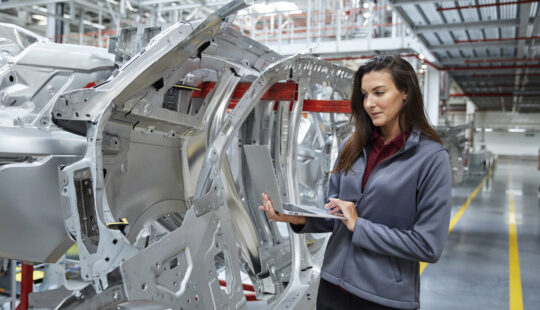Single-use plastics have become a cause célèbre of environmental issues. Not only are they filling up the world’s oceans, they are clearly connected to climate change. Single-use plastics require energy and other resources for their production. But they are cheap and convenient, so eliminating them is a challenge for enterprises, governments and, individuals.
Last year, SAP updated its Global Environmental Policy with a new goal to phase out single-use plastics by the end of 2020. Additionally, the company aims to achieve carbon neutrality by 2025, reduce water consumption, develop solutions that help customers to achieve sustainability goals, and enable employees to improve the environmental performance of SAP and its customers.
“With many of our customers striving to become more sustainable, our objective is to provide products and services that meet their sustainability challenges and opportunities,” says Christian Klein, CEO of SAP SE, who is convinced that in today’s world consumers are not only looking at the price and quality of a product, but at a brand’s degree of sustainability.
“At the same time, it is our responsibility to lead by example,” he says — and SAP employees agree. In a recent employee survey, 94 percent said the company should pursue sustainability, and 87 percent said they actively contribute to SAP’s sustainability goals.
“Employees play a critical role in eliminating single-use plastics,” SAP Chief Sustainability Officer Daniel Schmid says. “Through projects like ‘Beyond Single-Use Plastics,’ which was launched in July 2019, employees are helping us identify opportunities and find alternatives at all our locations.”
Shared Purpose
Eliminating single-use plastics has united SAP employees around the world with a common goal. The project began last year as a company-wide initiative, with the Global Real Estate and Facilities, Marketing, and Procurement organizations identified as focus areas. A joint commitment was made to implement measures and processes based on circular economy principles to reduce waste, reuse items, and recycle materials.
Implementation is part of SAP’s Global Environmental Management System that includes 55 sites, each with local plastic reduction targets. Passionate employees across the globe are bringing the program to life.
SAP Labs China, for example, identified areas where single-use plastics are utilized and then shared employee feedback with the Global Real Estate and Facilities team to implement changes and launch events to help reduce waste.
In SAP Ireland, a group of sustainability champions started the “Power of One” campaign to spread toolkits and tips for reducing single-use waste and raise awareness among colleagues and catering partners. Single-use plastics such as yogurt cups, bin bags, and sandwich wrappers were replaced with more sustainable alternatives.
At SAP Labs Hungary, colleagues started discussions with facility management and their corporate caterer on how to become more sustainable. As a result, single-use plastic cups, straws, and stirrers disappeared and the use of water bottles and glasses increased.
In the U.S., SAP offices in Naperville, Chicago, have been plastic-free for more than 15 years, and now have been joined by company offices in Boulder, Colorado. Meanwhile the office in Bellevue, Washington, is engaged in composting and part of the TerraCycle free recycling program for any plastic that enters the building.
These are just a few examples of initiatives at SAP locations worldwide.
Waste Not, Want Not
The other focus area of the ‘Beyond Single-Use Plastics’ project is increasing internal and external awareness about the global plastic problem. Earlier this year at the World Economic Forum in Davos, Klein announced SAP’s commitment to a cleaner ocean by 2030. SAP intends to help achieve this objective together with customers, non-governmental organizations (NGOs), governments, and partners by providing them with the tools and solutions to help eliminate waste and maximize resource productivity.
As Klein and other sustainability champions know, plastic itself is not the problem. Plastic has revolutionized the world in many ways — from sterile medical packaging to safe food storage. It has provided great benefits for societies everywhere.
“We need plastic, but without a doubt single-use plastic is one of the greatest contributors to waste on the planet,” Klein says. “The problem is what we do with it and how we dispose of it, so it does not end up in the ocean or littering the land.”
An Ongoing Journey
Other SAP actions to help reduce plastic pollution include Plastics Cloud, which helps customers manage the material more effectively through collaboration among business, government, and consumers across the plastics value chain. SAP has also joined the Ellen MacArthur Foundation Network, a leading circular economy initiative, and sponsors ocean activist Emily Penn.
These steps are all part of SAP’s decade-long journey toward becoming a more sustainable enterprise. The company also is committed to transparency and remains the only global software company that discloses its sustainability performance in a holistic integrated report.
According to Luka Mucic, member of the Executive Board of SAP SE and chief financial officer, “Our approach to quantifying the impact of social and environmental performance on our operating result is a significant differentiator, generating interest from investors and customers.”
More Work Ahead
When it comes to single-use plastics, the pandemic has helped to accelerate positive shifts in some areas. The Global Real Estate and Facilities team has taken advantage of office closures to take inventory of canteens and other spaces in the quest to eliminate single-use plastics by the end of the year. The team works closely with Change Management colleagues to identify challenges and gather advice on how to expedite the overall process.
The company’s move to digital events has also helped eliminate the need for single-use items. However, challenges remain. Progress made introducing reusable cups, dishes, and cutlery in many office canteens must now be carefully weighed against the hygiene concerns at some locations.
Nevertheless, the urgency of eliminating single-use plastics is mounting. As natural historian David Attenborough says: “The one thing we all have to do is simply not to waste. Don’t waste plastic; don’t waste food; don’t waste power. Live within our means. That’s what we should be aiming for.”
Follow Judith on Twitter: @magyarj



